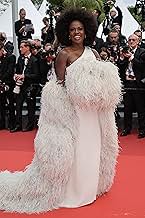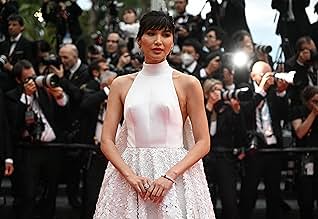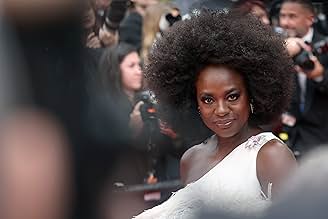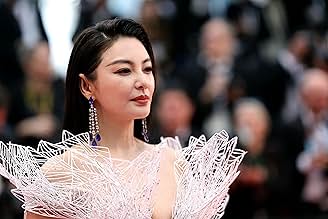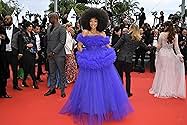Una madre exige respuestas a un profesor cuando su hijo empieza a actuar de forma extraña.Una madre exige respuestas a un profesor cuando su hijo empieza a actuar de forma extraña.Una madre exige respuestas a un profesor cuando su hijo empieza a actuar de forma extraña.
- Dirección
- Guionista
- Elenco
- Premios
- 10 premios ganados y 48 nominaciones en total
- Dirección
- Guionista
- Todo el elenco y el equipo
- Producción, taquilla y más en IMDbPro
Opiniones destacadas
I was lucky to catch this at TIFF, and also lucky to see it with the director in attendance.
I really don't think I can write anything eloquent enough to do justice to this film. The story is deceptively simple, told in an ingenious way, with a multidimensional understanding of each and every character. Every minute is crafted with purpose.
At one point near the ending, there's a moment of dialogue between two specific characters. I'm not going to give any details to avoid spoilers. These characters said some simple lines, but these lines were so devastating and emotionally pure that I can hardly describe it. The screenwriter and director made it all look so simple, yet something like this can't easily be replicated or achieved.
And the ending. I left the theatre thinking one thing, and then with more thought, it hit me like a train hours later.
I don't know when this will come to theatres, but I'll be eagerly awaiting its release.
I really don't think I can write anything eloquent enough to do justice to this film. The story is deceptively simple, told in an ingenious way, with a multidimensional understanding of each and every character. Every minute is crafted with purpose.
At one point near the ending, there's a moment of dialogue between two specific characters. I'm not going to give any details to avoid spoilers. These characters said some simple lines, but these lines were so devastating and emotionally pure that I can hardly describe it. The screenwriter and director made it all look so simple, yet something like this can't easily be replicated or achieved.
And the ending. I left the theatre thinking one thing, and then with more thought, it hit me like a train hours later.
I don't know when this will come to theatres, but I'll be eagerly awaiting its release.
I'm a fan of Kore-eda's feature films, namely the more Stream-of-consciousness movies from the earlier part of his career - MABOROSI, THE AFTERLIFE, & DISTANCE are among my favorites of his work from the mid-1990s to the early 2000s. In his subsequent films that seem to focus even more on social commentary via a neo-realist approach to story telling, Kore-eda managed to show just how good he is in directing children with little to no experience in acting to shine in NOBODY KNOWS and THE MIRACLE. In between, he experimented with comedy (HANA), a twist of fantasy collaborating with non-Japanese actors and cinematographer in AIR DOLL, and then back to more social-commentary and plot driven - some were Melodrama-esque, kitchen-sink films, and others he dabbled in crime whodunnit stories... all of which except for MABOROSI he took charge with writing the screenplays highlighting the fact these were personal stories and messages he wanted to share through the art of Kore-eda cinema.
While the 2 most recent Kore-eda films were overseas collaborations, they seem to show Kore-eda does his best work in Japan, and MONSTER (KAIBUTSU) shows how Kore-eda can shine even when the story isn't penned by himself.
To fans of Kore-eda's earlier films I'd mentioned above, MONSTER is much more story and character driven, and the story is much more accessible than his films prior to NOBODY KNOWS. Many film critics have highlighted the RASHOMON-like approach to story telling. While the technique is similar, the point intended is very different from Kurosawa's use of POV story reveal - Kore-eda uses POV to reveal the truths in the story, while Kurosawa uses perspective story telling to show the audience there is no objectivity with human memories - people will choose to remember and recall memories that isn't necessarily true, but serves to protect their self-interests.
To me, MONSTER has all the heart, humanity, and social commentary that I love from Kore-eda films, but it almost is too accessible for it to be a Kore-eda story - fair to say it isn't his story as he didn't write the screenplay this time. It actually feels like a Shunji Iwai film to me, and some scenes in MONSTER reminds me of Iwai's ALL ABOUT LILY CHOU CHOU. The ending of MONSTER, to me, has a tone & manner that reminds me of Studio Ghibli films like ONLY YESTERDAY (not by Hayao Miyazaki but the late director Isao Takahata) - the messages, the social commentary, the music cues and clues to the ending (if you consider lens flare and changes to the set props) are all so clearly planted - in fact, I wouldn't have expected Kore-eda to feel the audience need to get the ending, but he seems to want to make sure we do through Easter-egg-type devices in the movie (Pay attention to scenes showing the train tracks if you don't know what I mean)...
Is Kore-eda back in good form after dabbling with his French and Korean collaborations? The audience is the best to judge, but being a Kore-eda fan, I enjoyed MONSTER even though I was hoping for a film with less of the planted clues/cues, and this is from me who don't mind the Ozu-esque long takes(MABOROSI, THE AFTERLIFE), 10+ minutes of seeing feet on grass being lost in the woods (DISTANCE), or dialog so subtle you could easily miss that one line about vengeful hate that will make your heart sink (STILL WALKING)...
Last but not least, MONSTER was awarded the Queer Palm prize at Cannes - while I have no intentions to provide a spoiler here, but by virtue of winning the Queer Palm, MONSTER is now considered to be endorsed by the LGBTQ community - the fact that one reaction from a character towards another in one scene can turn what is otherwise no more than fondness/comraderie for children into a sign of Romantic Love, that which for boys at that age when companionship doesn't need to be associated with the idea of romance, let alone sexual orientation and preferences to validate and distinguish (I'm thinking more Mark Lester & Jack Wild in MELODY (1971), the characters of Jean and Julien in Louis Malle's AU REVOIR, LES ENFANTS (1987) and not the characters of Leo & Remi in a much more B/Romance-Losses-Causes focused narrative in CLOSE(2022)) - that one reaction so deliberately planted into the one scene is to me very un-Kore-eda. In my opinion this was done to ensure the audience get the intention without any doubt - wasn't necessary and seemed too deliberate for a Kore-eda film... but then and again, he didn't write the screenplay, and this must have been written deliberately as a key plot-point so to broaden the audience appeal.
While the 2 most recent Kore-eda films were overseas collaborations, they seem to show Kore-eda does his best work in Japan, and MONSTER (KAIBUTSU) shows how Kore-eda can shine even when the story isn't penned by himself.
To fans of Kore-eda's earlier films I'd mentioned above, MONSTER is much more story and character driven, and the story is much more accessible than his films prior to NOBODY KNOWS. Many film critics have highlighted the RASHOMON-like approach to story telling. While the technique is similar, the point intended is very different from Kurosawa's use of POV story reveal - Kore-eda uses POV to reveal the truths in the story, while Kurosawa uses perspective story telling to show the audience there is no objectivity with human memories - people will choose to remember and recall memories that isn't necessarily true, but serves to protect their self-interests.
To me, MONSTER has all the heart, humanity, and social commentary that I love from Kore-eda films, but it almost is too accessible for it to be a Kore-eda story - fair to say it isn't his story as he didn't write the screenplay this time. It actually feels like a Shunji Iwai film to me, and some scenes in MONSTER reminds me of Iwai's ALL ABOUT LILY CHOU CHOU. The ending of MONSTER, to me, has a tone & manner that reminds me of Studio Ghibli films like ONLY YESTERDAY (not by Hayao Miyazaki but the late director Isao Takahata) - the messages, the social commentary, the music cues and clues to the ending (if you consider lens flare and changes to the set props) are all so clearly planted - in fact, I wouldn't have expected Kore-eda to feel the audience need to get the ending, but he seems to want to make sure we do through Easter-egg-type devices in the movie (Pay attention to scenes showing the train tracks if you don't know what I mean)...
Is Kore-eda back in good form after dabbling with his French and Korean collaborations? The audience is the best to judge, but being a Kore-eda fan, I enjoyed MONSTER even though I was hoping for a film with less of the planted clues/cues, and this is from me who don't mind the Ozu-esque long takes(MABOROSI, THE AFTERLIFE), 10+ minutes of seeing feet on grass being lost in the woods (DISTANCE), or dialog so subtle you could easily miss that one line about vengeful hate that will make your heart sink (STILL WALKING)...
Last but not least, MONSTER was awarded the Queer Palm prize at Cannes - while I have no intentions to provide a spoiler here, but by virtue of winning the Queer Palm, MONSTER is now considered to be endorsed by the LGBTQ community - the fact that one reaction from a character towards another in one scene can turn what is otherwise no more than fondness/comraderie for children into a sign of Romantic Love, that which for boys at that age when companionship doesn't need to be associated with the idea of romance, let alone sexual orientation and preferences to validate and distinguish (I'm thinking more Mark Lester & Jack Wild in MELODY (1971), the characters of Jean and Julien in Louis Malle's AU REVOIR, LES ENFANTS (1987) and not the characters of Leo & Remi in a much more B/Romance-Losses-Causes focused narrative in CLOSE(2022)) - that one reaction so deliberately planted into the one scene is to me very un-Kore-eda. In my opinion this was done to ensure the audience get the intention without any doubt - wasn't necessary and seemed too deliberate for a Kore-eda film... but then and again, he didn't write the screenplay, and this must have been written deliberately as a key plot-point so to broaden the audience appeal.
During the initial hour, you may experience a state of complete bewilderment, unsure of the exact themes being portrayed in here. Is it centred around the troubled minds of children, or does it delve into the realms of bullying, abuse, or even something more sinister?
Several questions will plague your mind, regardless of your strong inclination to scrutinise this narrative, you will find little to no clarity due to the intricately crafted script that almost follows a 'Rashomon' structure, presenting different perspectives.
At the outset, your queries will remain unanswered, requiring further patience. However, if you can somehow endure that burden, the film remarkably unravels itself in the concluding moments, connecting every single dot and revealing its ultimate truth underneath.
I must admit, I was blown away by the revelation. The way Hirokazu Koreeda, the director, masterfully navigates through such delicate and complex themes without resorting to any impure contemplations is commendable, to say the very least.
"Monster" has now undoubtedly become my personal favourite from him, even exceeding one of his most acclaimed work, 'Shoplifters'.
P. S. The performances delivered by the two kids, Soya Kurokawa (Minato) and Hinata Hiiragi (Yori), were nothing short of outstanding. The scenes between them never felt superficial, not once, and their maturity, especially considering their young age, deserves nothing but high praise.
Several questions will plague your mind, regardless of your strong inclination to scrutinise this narrative, you will find little to no clarity due to the intricately crafted script that almost follows a 'Rashomon' structure, presenting different perspectives.
At the outset, your queries will remain unanswered, requiring further patience. However, if you can somehow endure that burden, the film remarkably unravels itself in the concluding moments, connecting every single dot and revealing its ultimate truth underneath.
I must admit, I was blown away by the revelation. The way Hirokazu Koreeda, the director, masterfully navigates through such delicate and complex themes without resorting to any impure contemplations is commendable, to say the very least.
"Monster" has now undoubtedly become my personal favourite from him, even exceeding one of his most acclaimed work, 'Shoplifters'.
P. S. The performances delivered by the two kids, Soya Kurokawa (Minato) and Hinata Hiiragi (Yori), were nothing short of outstanding. The scenes between them never felt superficial, not once, and their maturity, especially considering their young age, deserves nothing but high praise.
A very well constructed film exploring the complexity of how simple words and actions affect people in unexpected ways. Highly relatable in showing how, armed with only a superficial understanding of a person or situation, context can be manufactured to fit a particular narrative. But not only individuals, but institutions as well are put in the crosshairs. The bureaucratic value placed on appearance and propriety (perhaps more particularly in Japanese society but nevertheless universal) is also critiqued.
But the most telling point, and for me the one most central to the story, was what could have been dismissed as a throw-away line. But at its heart, the perfect example of how simple words create a life of their own. It's when the teacher, Mr. Hori, casually, and quite un-seriously, remarks in the PE class about what it is to be a man. At its core, that's what the film is about, understanding who you are as a human, and accepting it on your own terms. Confusion, misinterpretation, familial and societal expectations of how someone must be, or act, or love, can turn them into the other, the strange, the monster. And the film is overflowing with empathy for all those who become afflicted in one way or another.
If the film has one drawback, it's that the editing in the later stages of the film gets a bit loose. The time-jump and multiple perspective structure of the film works magnificently well for most of the film, but nearing the end, it does tend to drag a bit. But overall, a wonderfully engaging and skillfully produced film.
But the most telling point, and for me the one most central to the story, was what could have been dismissed as a throw-away line. But at its heart, the perfect example of how simple words create a life of their own. It's when the teacher, Mr. Hori, casually, and quite un-seriously, remarks in the PE class about what it is to be a man. At its core, that's what the film is about, understanding who you are as a human, and accepting it on your own terms. Confusion, misinterpretation, familial and societal expectations of how someone must be, or act, or love, can turn them into the other, the strange, the monster. And the film is overflowing with empathy for all those who become afflicted in one way or another.
If the film has one drawback, it's that the editing in the later stages of the film gets a bit loose. The time-jump and multiple perspective structure of the film works magnificently well for most of the film, but nearing the end, it does tend to drag a bit. But overall, a wonderfully engaging and skillfully produced film.
Lovingly detailed and accented by an aching score from Ryuichi Sakamoto, who died in March, Monster is one of the finest films of the year, and its structure - like its circle of characters - carries secrets that can only be unraveled through patience and empathy. By cutting things up and showing us the perils of fractured perspectives, the director, demonstrates that compassion is more than just a natural state of being. This absorbing, ambiguously titled movie builds to a moving finish, one that reaffirms Kore-eda's peerless skill at directing young actors in particular..
My Rating : 8.5/10.
My Rating : 8.5/10.
¿Sabías que…?
- TriviaKoreeda said that all the characters in the film, to some degree, are imprisoned by invisible walls. "The mother is restricted by social norms, and the teacher is restricted by his manhood, as well as the school system. And the children are living in this world that the adults have created and they are affected by it, in terms of the violence that is perpetrated upon them. Yet they are able to escape it. It's as if the adults have been left behind, and the children have gone ahead and come to their own self-realization. I wanted it to be a positive realization."
- Bandas sonorasAqua
Written by Ryuichi Sakamoto
Performed by Ryuichi Sakamoto
Selecciones populares
Inicia sesión para calificar y agrega a la lista de videos para obtener recomendaciones personalizadas
- How long is Monster?Con tecnología de Alexa
Detalles
Taquilla
- Total en EE. UU. y Canadá
- USD 434,585
- Fin de semana de estreno en EE. UU. y Canadá
- USD 25,603
- 26 nov 2023
- Total a nivel mundial
- USD 20,453,866
- Tiempo de ejecución2 horas 7 minutos
- Color
- Mezcla de sonido
- Relación de aspecto
- 2.39 : 1
Contribuir a esta página
Sugiere una edición o agrega el contenido que falta

Principales brechas de datos
What was the official certification given to Monster (2023) in Italy?
Responda


